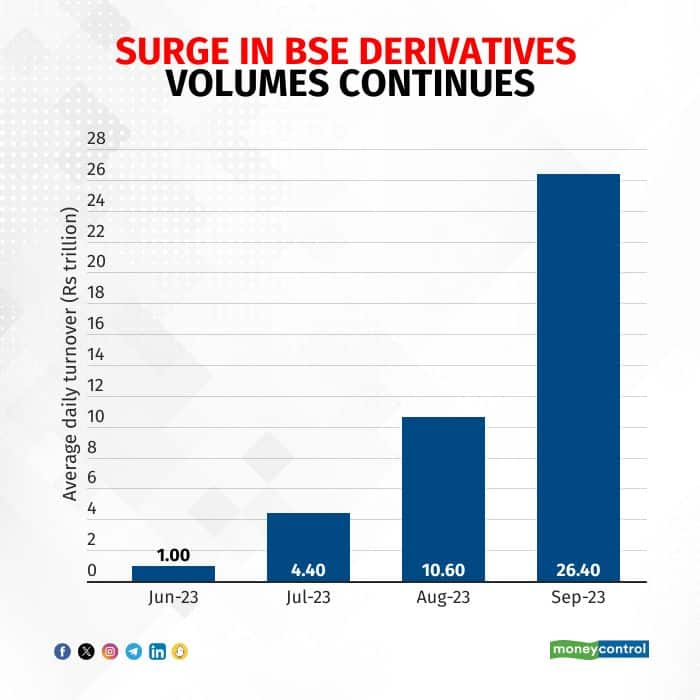



Shares of BSE Ltd was trading at Rs 410 each in early April. Six months on, it now flaunts a tag of Rs 1,440, thanks to a 240 percent surge on hopes of a strong earnings growth as the bourse enters into the index options space.
The stock jumped over 30 percent each in July and August, while September saw an over 22 percent rise. A look into the factors behind this exceptional rally shows a host of factors playing in the near to medium term. The likely growth drivers for the BSE stock include greater volumes in equity and index derivatives, wider cash segment participation, rising charges on equity derivatives, increased transaction fees for index options, stronger Star MF business momentum, and higher charges on the INX platform.
BSE is rapidly gaining market share in derivatives since it brought back the weekly index options for the Sensex and the Bankex in May that are now dominating almost all of the BSE derivatives trading. These financial derivatives allow investors to trade options contracts with weekly expiration, instead of the standard monthly options.
The bourse introduced options on futures for precious metals and energy (WTI and Brent crude) and futures contracts for base metals (copper, zinc, aluminum) on October 9.
Read: Wall Street advances as investors monitor Mideast conflict headlines
Analysts predicted that BSE's share in the derivatives market will hit 10 percent in Q4 of FY24, riding on factors such as the inclusion of major member brokers, introduction of weekly index contracts, increased hedging, and a growing number of active traders. This growth in derivatives trading is expected to have a positive impact on cash volumes, thanks to effective measures implemented by the new management that are starting to show results, ultimately contributing to growth and improved margins.

In September, BSE's equity derivatives market share reached 7.4 percent from zero in May. The expiry day market share is even higher and growing at 11 percent without any liquidity enhancement scheme. The derivatives volume is organic and driven by 219 members (proprietary and retail), and the active unique client codes (UCCs) on the BSE derivatives platform have reached 0.17 million, up from nearly zero in three months, analysts said.
The option premium average daily turnover volume (ADTV) increased 1.2 times month-on-month (MoM) to Rs 14.9 lakh crore, with a market share of 2.30 percent in September 2023, up 120 basis points (bps) over last month. Index options make up nearly 100 percent of BSE's derivatives volume. Rival NSE's derivative volume now stands at 30 times that of BSE's on a monthly basis.

The analysts pegged the NSE revenue from index options at Rs 10,000 crore. As BSE ventures into this huge market, its options realisation stands at one-seventh of that of the NSE's. A 1 percent market share of derivatives is worth Rs 100 crore. If BSE corners a 1 percent share of the market, it will generate a revenue of Rs 14 crore for the bourse, which is 1.7/5 percent of BSE’s FY23 revenue/EBITDA.
"This gives us an idea of how large the opportunity is. NSE derives approximately Rs 10,000 crore of revenue from index options per annum and BSE has just ventured into this opportunity," said brokerage firm Sharekhan. Analysts expect BSE derivative volume to reach ADTV of Rs 42 lakh crore in FY25E, with a volume/premium market share of 10.6/4.4 percent.
Read: Why this fund manager predicts cautious stand in IT management commentaries
BSE's cash market daily trading volume is surging thanks to rising derivative activity. In September 2023, the average daily turnover increased by 15.6 percent year-on-year (YoY) to Rs 6,210 crore. The market share had gradually improved to around 7.4 percent by the end of September. Expect even stronger cash volumes as derivatives trading continues to grow, analysts said.
Scope for pricing reset
Analysts expect increases in option charges to be a vital driver of growth in the medium term. BSE previously experimented with different pricing strategies, including steep discounts and no charges, in its segments to compete with NSE. However, these efforts didn't result in gaining market share.
Under the new management, BSE has chosen to align its pricing with NSE, recognising that exchange transaction charges alone don't significantly influence trading volumes. Consequently, BSE has raised the fees for cash transactions, currency futures, and listings to match NSE's rates. In fact, BSE now charges a premium compared to NSE.
BSE charges Rs 50 per million for options contract premium turnover, while NSE charges a much higher rate of Rs 350 a million.
"We expect these transaction charges to increase gradually as volumes pick up and reach a satisfactory level. However, increased charges have not been factored in the estimates and, thus, may lead to an upside risk," Sharekhan added. It believes BSE is likely to deliver a strong earnings CAGR of 40 percent over the next three years.
Brokerage firm HDFC Securities expects a revenue/EPS average growth rate of 19/25 percent over FY23-26, led by a revival in transaction revenue. It increased the EPS estimates by 7/11 percent for FY24/25, increased the core multiple to 28x (vs 25x), and upgraded the rating to Buy.
The BSE stock got listed on NSE in February 2017 after raising Rs 1240 crore and the issue price was at Rs 806 a share. Since listing the stock was trading below its IPO issue price.
Discover the latest Business News, Sensex, and Nifty updates. Obtain Personal Finance insights, tax queries, and expert opinions on Moneycontrol or download the Moneycontrol App to stay updated!
Find the best of Al News in one place, specially curated for you every weekend.
Stay on top of the latest tech trends and biggest startup news.